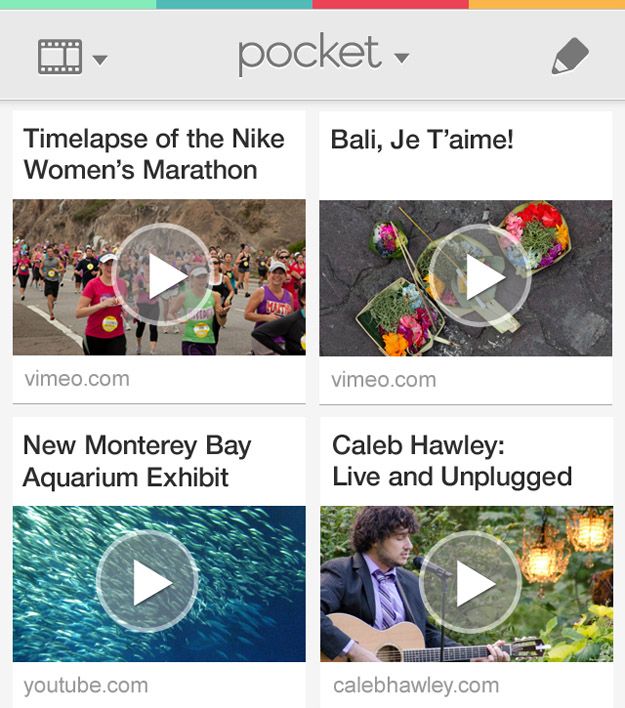Failure is integral to success, says Nate Weiner. “You don’t learn by knocking it out of the park every time. You learn when you fail at something. Failing is the best thing an entrepreneur can do.”
Weiner is a pro at failing. After learning to code at age 14, he went to college for criminal justice, but dropped out after two years (“I’m too skinny to be a cop,” he jokes) to work on websites for small-business clients. In his spare time, he built six companies. Five of them failed, but the one that made it would eventually become Pocket, an online application that allows users to save content for later viewing.
Today, Pocket has more than 80 million users, and Weiner is leading a team of 12 out of an office in San Francisco.
A Simple Solution
After dropping out of college in Illinois, Weiner moved to Colorado and then to Minneapolis, all the while tinkering with a variety of business ideas. In 2007, he was involved in Web consulting with startups and advertising agencies, but was most interested in the businesses he would hatch in his apartment designed to solve common problems. One problem: coming across too much interesting Web content to read all at once.
“I’d see things I wanted to read but didn’t have time, so I would email links to myself,” Weiner says. “But then those emails would just get lost in my inbox.”
To solve this, Weiner created a Web browser extension that enabled him to hit a button and save links to read later, aptly naming the extension Read it Later. It took him less than an hour to create.
Two years later, he made a smartphone application for Read it Later. He and his girlfriend (now wife) were tired of Minneapolis winters, and in January 2010, moved to San Francisco with a simple plan to focus on Read it Later, live a quiet life and travel.
“It sounded so perfect. We thought I could just manage the app from anywhere and we’d live a carefree life,” Weiner says. “But by the time we got out here, we realized the company was getting too big. Read it Later had 2.5 million users and we started to get approached by big companies who wanted to buy us.”
RELATED: 5 Ways to Tell if a Deal Is Bad
Flattered, Weiner met with several but came away from each meeting with the same feeling. “They would sound interested, but in the end I knew we would just get shut down and I would become another employee,” he says.
From Programmer to CEO
By summer 2010, more than 3.5 million people were using Read it Later. Weiner was making a bit of money through the app, but not enough to build his company, so he enlisted the help of Silicon Valley VCs. Within a week, he was presented with a term sheet for $2.5 million.
Weiner hired a handful of staff and started to build his team. Since then, he has secured another $5 million in funding and last year rebranded the company Pocket for a few reasons.
“Since our launch in 2007, we’ve had several competitors come onto the scene, and the phrase ‘read it later’ almost became a feature inside their products. People had no idea that we were our own product and company,” he says. “We didn’t want to be ‘Kleenexed’ in that way, so we changed our name to Pocket as a way to describe that you can save anything and it will go with you wherever your go—on your laptop, tablet, smartphone, etc.”
The experience hasn’t exactly been smooth for Weiner. Most of Pocket’s growth has occurred in the last 18 months, which has forced Weiner to switch functions—from programmer to CEO—and the transition has proved difficult. He admits to learning more every day about hiring the right people, managing the company’s many moving parts and trying to keep some balance between his home life and work life.
RELATED: Richard Branson on How to Overcome Growing Pains
“My wife laughs when I talk about work-life balance, but I am trying,” he says. He adds one piece of balancing advice from personal experience: “Don’t plan a wedding the same year that you raise money for your company—at least if you value your sanity.”
Is Revenue in Pocket's Future?
Right now, Pocket isn't making any profit because the app is free (the app was paid until spring 2012, but Weiner and his team wanted to change the business model moving forward).
In the future, Pocket will operate a lot like Pandora and Evernote. All users will have access to a free slice of the service, but in order to access premium features, a paid subscription will be required.
Looking ahead, Weiner has a few goals: to hire more employees in the coming year and to become a household name.
“I see us completely changing the publishing industry,” he says. “By using Pocket, publications will be able to extend the lifetime of their content. Things will keep living on for weeks and months, and then people will circle back to their Pocket to access things like we do with DVDs and DVRs today.”
Read more articles on leadership.
Katie Morell is an independent journalist based in San Francisco. She regularly contributes to Hemispheres, USA Today, Consumers Digest, Destination Weddings & Honeymoons, Crain’s Chicago Business and others.
Photos: Courtesy of Pocket





